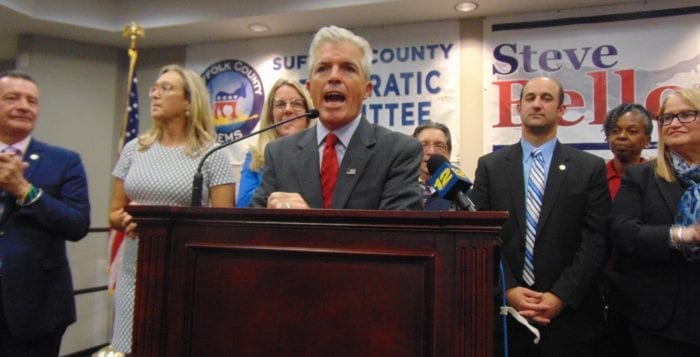County Exec Says New Executive Orders Won’t Help Suffolk County’s Finances
Bellone: County Looking at Potential $800 Million Gap in Next Budget Cycle

As Suffolk County Executive Steve Bellone (D) among other officials continue their crusade to get federal assistance to local government, he said come next month, Suffolk may have to create a budget around a $800 million hole.
Counties on Long Island may be some of the hardest hit financially compared to other New York State counties outside New York City. During a media call Aug. 10 where Bellone talked with two fellow county execs from Upstate New York about the need for federal relief, Dutchess County Executive Marc Molinaro (R) said his county was facing a lesser but no less devastating $60 million gap. This stacks up to the devastation caused by COVID-19 in each county. Whereas Suffolk County has seen over 43,000 cases and close to 2,000 deaths, the less populous Dutchess has seen 4,613 cases and just 153 deaths.
But overall, despite partisanship, all electeds are concerned with the impending financial cliff. The bipartisan National Association of Counties said in a release in late July that county budgets could see a total loss of $202 billion from the coronavirus pandemic.
“The outset of national disaster took us all by surprise, did not expect what has happened here, we knew from outset we would not only be dealing with a public health crisis, but followed by an economic crisis, a human services crisis and a fiscal crisis,” Bellone said. “I’ve been through fiscal crises before, but we’re calling this a fiscal emergency — we’ve never dealt with something like this before.”
Broome County Executive Jason Garnar (D) said it even more succinctly.
“I think the only worse thing you could do is drop a bomb on our county,” Garnar said during the Aug. 11 media call.
Hope rests on a federal bailout, but talks have been mired in political wrangling. The House of Representatives passed the $3 trillion HEROES Act almost three months ago that would have, among other stimulus, provided aid to state and local governments. The bill was universally supported by Democrats, though a select few Republicans including local U.S. Rep. Pete King (R-NY-2) also gave their support.
The Republican-controlled Senate refused to pick up the bill, and negotiations for its own stimulus bill stagnated. When negotiations later broke down between the While House and House and Senate Democrats, President Donald Trump (R) signed several executive orders Aug. 7. One such order authorized $300 out of $400 in additional payments to people on unemployment, though cash-strapped states who are facing their own financial crises are supposed to pick up the last $100.
The bipartisan National Governors Association, led by Gov. Andrew Cuomo (D), has requested unrestricted $500 billion in state aid. The association criticized the president’s executive orders in a statement Aug. 10 for “the significant administrative burdens and costs this latest action would place on the states.”
Bellone and his fellow county executives said they were concerned that without federal assistance social services that have been overloaded since the start of the pandemic could be facing cuts and layoffs. The Suffolk County Executive said he is “having discussions with all our bargaining units” including the police union.
“If you’re not going to provide assistance to local governments that provide public safety and public health … our public health workers, all services that we provide will be even more important,” Bellone said. “It will take a couple years at least to get back on our feet again. We are looking at extending this devastation and that’s just unacceptable.”






